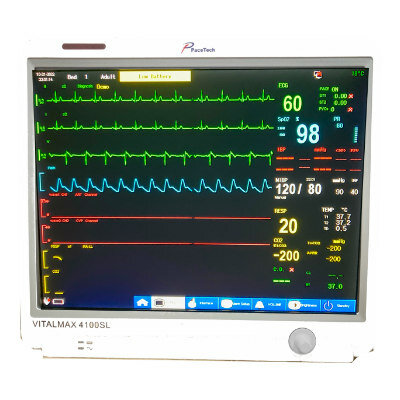Ultrasensitive Sensor Detects Down Syndrome in Womb
|
By HospiMedica International staff writers Posted on 28 Feb 2019 |
A new biosensor could someday be used to detect fetal Down syndrome DNA in pregnant women's blood, according to a new study.
Developed by researchers at Peking University (Beijing, China), the National Research Institute for Family Planning of China (NHC; Beijing) and the Chinese Academy of Sciences (Shenyang, China), the highly sensitive DNA biosensors are based on a field-effect transistor (FET) fabricated using chemical vapor deposition grown monolayer molybdenum disulfide (MoS2) films. The MoS2 is functionalized with gold nanoparticles of an optimized size and ideal density, allowing the DNA biosensor to probe for specific target immobilized on the nanoparticles.
Study results revealed that the fabricated FET biosensors were able to reliably detect target DNA fragments (chromosome 21 or 13) with a detection limit below 100 aM, a high response rate of up to 240%, and a high specificity, which satisfy the requirement for the screening of Down syndrome. In addition, a real-time in-vitro test was conducted to show that the biosensor clearly responds to the target DNA at concentrations as low as one fM. The study was published on February 13, 2019, in Nano Letters.
“Our approach shows the potential for detecting the over-expression of chromosome 21 in the peripheral blood of pregnant women,” concluded lead author Jingxia Liu, PhD, of Peking University, and colleagues. “Eventually, the test could be used to compare levels of chromosome 21 DNA in blood with that of another chromosome, such as 13, to determine if there are extra copies, suggesting a fetus has Down syndrome.”
Down syndrome, which is characterized by variable degrees of intellectual and developmental problems, is caused by the presence of an extra copy of chromosome 21. To screen for the condition, pregnant women can have ultrasound scans or indirect blood biomarker tests, but misdiagnosis rates are high. Amniocentesis can provides a definitive diagnosis, but the procedure poses risks to both the pregnant woman and the fetus. And while the emerging method of whole-genome sequencing is highly accurate, it is a slow and expensive process.
Related Links:
Peking University
National Research Institute for Family Planning of China
Chinese Academy of Sciences
Developed by researchers at Peking University (Beijing, China), the National Research Institute for Family Planning of China (NHC; Beijing) and the Chinese Academy of Sciences (Shenyang, China), the highly sensitive DNA biosensors are based on a field-effect transistor (FET) fabricated using chemical vapor deposition grown monolayer molybdenum disulfide (MoS2) films. The MoS2 is functionalized with gold nanoparticles of an optimized size and ideal density, allowing the DNA biosensor to probe for specific target immobilized on the nanoparticles.
Study results revealed that the fabricated FET biosensors were able to reliably detect target DNA fragments (chromosome 21 or 13) with a detection limit below 100 aM, a high response rate of up to 240%, and a high specificity, which satisfy the requirement for the screening of Down syndrome. In addition, a real-time in-vitro test was conducted to show that the biosensor clearly responds to the target DNA at concentrations as low as one fM. The study was published on February 13, 2019, in Nano Letters.
“Our approach shows the potential for detecting the over-expression of chromosome 21 in the peripheral blood of pregnant women,” concluded lead author Jingxia Liu, PhD, of Peking University, and colleagues. “Eventually, the test could be used to compare levels of chromosome 21 DNA in blood with that of another chromosome, such as 13, to determine if there are extra copies, suggesting a fetus has Down syndrome.”
Down syndrome, which is characterized by variable degrees of intellectual and developmental problems, is caused by the presence of an extra copy of chromosome 21. To screen for the condition, pregnant women can have ultrasound scans or indirect blood biomarker tests, but misdiagnosis rates are high. Amniocentesis can provides a definitive diagnosis, but the procedure poses risks to both the pregnant woman and the fetus. And while the emerging method of whole-genome sequencing is highly accurate, it is a slow and expensive process.
Related Links:
Peking University
National Research Institute for Family Planning of China
Chinese Academy of Sciences
Latest Patient Care News
- Surgical Capacity Optimization Solution Helps Hospitals Boost OR Utilization

- Game-Changing Innovation in Surgical Instrument Sterilization Significantly Improves OR Throughput
- Next Gen ICU Bed to Help Address Complex Critical Care Needs
- Groundbreaking AI-Powered UV-C Disinfection Technology Redefines Infection Control Landscape
- Clean Hospitals Can Reduce Antibiotic Resistance, Save Lives
- Smart Hospital Beds Improve Accuracy of Medical Diagnosis
- New Fast Endoscope Drying System Improves Productivity and Traceability
- World’s First Automated Endoscope Cleaner Fights Antimicrobial Resistance
- Portable High-Capacity Digital Stretcher Scales Provide Precision Weighing for Patients in ER
- Portable Clinical Scale with Remote Indicator Allows for Flexible Patient Weighing Use
- Innovative and Highly Customizable Medical Carts Offer Unlimited Configuration Possibilities
- Biomolecular Wound Healing Film Adheres to Sensitive Tissue and Releases Active Ingredients
- Wearable Health Tech Could Measure Gases Released From Skin to Monitor Metabolic Diseases
- Wearable Cardioverter Defibrillator System Protects Patients at Risk of Sudden Cardiac Arrest
- World's First AI-Ready Infrasound Stethoscope Listens to Bodily Sounds Not Audible to Human Ear
- POC Diagnostic Platform Offers Handheld, Instrument-Free PCR Testing for STIs
Channels
Artificial Intelligence
view channel
AI-Powered Algorithm to Revolutionize Detection of Atrial Fibrillation
Atrial fibrillation (AFib), a condition characterized by an irregular and often rapid heart rate, is linked to increased risks of stroke and heart failure. This is because the irregular heartbeat in AFib... Read more
AI Diagnostic Tool Accurately Detects Valvular Disorders Often Missed by Doctors
Doctors generally use stethoscopes to listen for the characteristic lub-dub sounds made by heart valves opening and closing. They also listen for less prominent sounds that indicate problems with these valves.... Read moreCritical Care
view channel
Deep-Learning Model Predicts Arrhythmia 30 Minutes before Onset
Atrial fibrillation, the most common type of cardiac arrhythmia worldwide, affected approximately 59 million people in 2019. Characterized by an irregular and often rapid heart rate, atrial fibrillation... Read more
Breakthrough Technology Combines Detection and Treatment of Nerve-Related Disorders in Single Procedure
The peripheral nervous system (PNS) serves as the communication network that links the brain and spinal cord to every other part of the body. It consists of two parts: the somatic nervous system, which... Read moreSurgical Techniques
view channel
Hydrogel-Based Miniaturized Electric Generators to Power Biomedical Devices
The development of engineered devices that can harvest and convert the mechanical motion of the human body into electricity is essential for powering bioelectronic devices. This mechanoelectrical energy... Read moreWearable Technology Monitors and Analyzes Surgeons' Posture during Long Surgical Procedures
The physical strain associated with the static postures maintained by neurosurgeons during long operations can lead to fatigue and musculoskeletal problems. An objective assessment of surgical ergonomics... Read more.jpg)
Custom 3D-Printed Orthopedic Implants Transform Joint Replacement Surgery
The evolving field of 3D printing is revolutionizing orthopedics, especially for individuals requiring joint replacement surgeries where traditional implants fail to provide a solution. Although most people... Read more
Cutting-Edge Imaging Platform Detects Residual Breast Cancer Missed During Lumpectomy Surgery
Breast cancer is becoming increasingly common, with statistics indicating that 1 in 8 women will develop the disease in their lifetime. Lumpectomy remains the predominant surgical intervention for treating... Read moreHealth IT
view channel
Machine Learning Model Improves Mortality Risk Prediction for Cardiac Surgery Patients
Machine learning algorithms have been deployed to create predictive models in various medical fields, with some demonstrating improved outcomes compared to their standard-of-care counterparts.... Read more
Strategic Collaboration to Develop and Integrate Generative AI into Healthcare
Top industry experts have underscored the immediate requirement for healthcare systems and hospitals to respond to severe cost and margin pressures. Close to half of U.S. hospitals ended 2022 in the red... Read more
AI-Enabled Operating Rooms Solution Helps Hospitals Maximize Utilization and Unlock Capacity
For healthcare organizations, optimizing operating room (OR) utilization during prime time hours is a complex challenge. Surgeons and clinics face difficulties in finding available slots for booking cases,... Read more
AI Predicts Pancreatic Cancer Three Years before Diagnosis from Patients’ Medical Records
Screening for common cancers like breast, cervix, and prostate cancer relies on relatively simple and highly effective techniques, such as mammograms, Pap smears, and blood tests. These methods have revolutionized... Read morePoint of Care
view channel
Critical Bleeding Management System to Help Hospitals Further Standardize Viscoelastic Testing
Surgical procedures are often accompanied by significant blood loss and the subsequent high likelihood of the need for allogeneic blood transfusions. These transfusions, while critical, are linked to various... Read more
Point of Care HIV Test Enables Early Infection Diagnosis for Infants
Early diagnosis and initiation of treatment are crucial for the survival of infants infected with HIV (human immunodeficiency virus). Without treatment, approximately 50% of infants who acquire HIV during... Read more
Whole Blood Rapid Test Aids Assessment of Concussion at Patient's Bedside
In the United States annually, approximately five million individuals seek emergency department care for traumatic brain injuries (TBIs), yet over half of those suspecting a concussion may never get it checked.... Read more
New Generation Glucose Hospital Meter System Ensures Accurate, Interference-Free and Safe Use
A new generation glucose hospital meter system now comes with several features that make hospital glucose testing easier and more secure while continuing to offer accuracy, freedom from interference, and... Read moreBusiness
view channel
Johnson & Johnson Acquires Cardiovascular Medical Device Company Shockwave Medical
Johnson & Johnson (New Brunswick, N.J., USA) and Shockwave Medical (Santa Clara, CA, USA) have entered into a definitive agreement under which Johnson & Johnson will acquire all of Shockwave’s... Read more
















